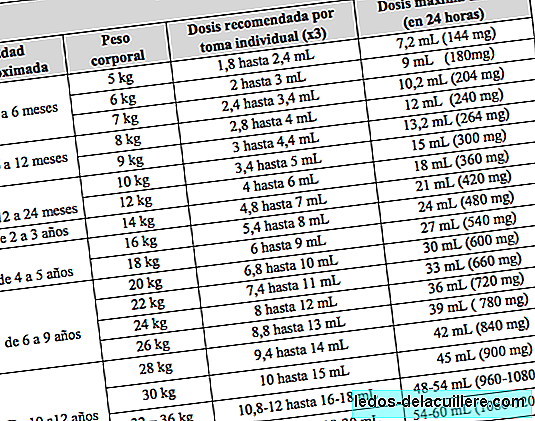Ibuprofen is a drug widely used in children. Being a medication for children, bought without a prescription and being cheap, we believe it is harmless, and we give them for everything: there is pain or not, there is inflammation or not, because the belly hurts, because it has a few tenths, because it is dropped, etc ...
It is a reality that too many mothers abuse ibuprofen, but it is important to know that an excessive amount of this medicine that we use so often with our children, as with all medicines, can produce unwanted effects. Therefore, We explain how to avoid misuse.
Use of ibuprofen: how and how much
Ibuprofen is a medication with analgesic action (for pain), anti-thermal (for fever) and, unlike paracetamol, also of anti-inflammatory action.
In Spain we know it with the name of Dalsy, Junifen, Pirexin or Gelofeno in concentrations of 2% and 4%. Keep in mind that ibuprofen cannot be given to newborn babies, since its use is not recommended in children weighing less than 5 kilos and that its use in children under 2 years should always be done by medical prescription.
It is indicated for reduce mild or moderate pain with an inflammatory component such as otitis, dental pain or reduce osteoarticular pain and swelling due to an injury or fracture. Also for feverish conditions, relieve headache or throat irritation.
It is not recommended to give when there is continued vomiting or gastroenteritis.
How much do I give it?
 Dalsy (ibuprofen) dose recommendation in children
Dalsy (ibuprofen) dose recommendation in children Ibuprofen abuse and its risk in children
In the leaflet there are some recommendations of dose and frequency of shots that should not be ignored. The recommended daily dose is 20 to 30 mg per kg of weight, divided into three doses. It is recommended not to exceed the maximum dose of 40 mg per kg of weight per day of ibuprofen.
Failure to respect the doses and in prolonged treatments, they warn that it can be toxic for the liver, for the kidney, to produce gastric discomfort, including gastrointestinal bleeding, diarrhea and constipation. In treatments of less than 6 days they rarely cause renal toxicity or gastric injury.
Last year, the Ministry of Health warned that ibuprofen, administered in large quantities can lead to cardiovascular risk.
In the Dalsy leaflet, we can find these warnings:
Medications such as Dalsy can be associated with a moderate increase in the risk of heart attacks ("myocardial infarction") or brain attacks. Such risk is more likely to occur when high doses and prolonged treatments are used. Do not exceed the dose or the recommended treatment duration.
If you have heart problems, a history of brain attacks or think you may be at risk for these conditions (for example, you have high blood pressure, suffer from diabetes, have increased cholesterol or are a smoker) you should consult this treatment with your doctor or pharmacist .
There is a risk of kidney damage in dehydrated children and adolescents.
Ibuprofen and fever in children

Fever is a mechanism of defense of the organism, therefore the anthermic agents are not always necessary to lower the fever and there are also natural remedies to lower the fever that we can put into practice before giving a medicine. The rapidity at the time of administering antitérmicos is not a good measure, since when reducing the corporal temperature, the body loses capacity to fight against the infectious agents.
According to the AEPap Decalogue, you just have to use fever medication if there is discomfort or pain. Ibuprofen and paracetamol have the same efficacy in treating pain, and although it is sometimes recommended to alternate when the fever does not go down, there is no scientific evidence that it is more effective than always using it.
How to avoid the misuse of ibuprofen?
Calculate the dose we administer well: The dose is calculated depending on the child's weight (see chart). Here we explain in detail how to calculate the dose of ibuprofen that the child has to take.
In case of fever, as we said before, look for alternative methods to lower it and administer only in case of pain or discomfort.
Give it at the indicated intervals: every 6-8 hours, never less than 4 hours. We do not achieve a greater effect by giving it more often, instead we can produce intoxication.
Being a syrup in suspension shake the jar before loading the syringe.
Control concentration of ibuprofen containing the medicine. There are concentrations for children at 2 and 4%, if we change the brand, always check the dose that we should administer to avoid confusion.
Use the smallest dose to relieve / control pain
Use it for the shortest possible time and always follow the instructions in the leaflet.
Keep out of reach of children: Many children like and better avoid temptations.
Photos | iStockphoto and archibaldjude (Flickr CC)
In Babies and more | Dalsy is still safe for children, according to pediatricians












